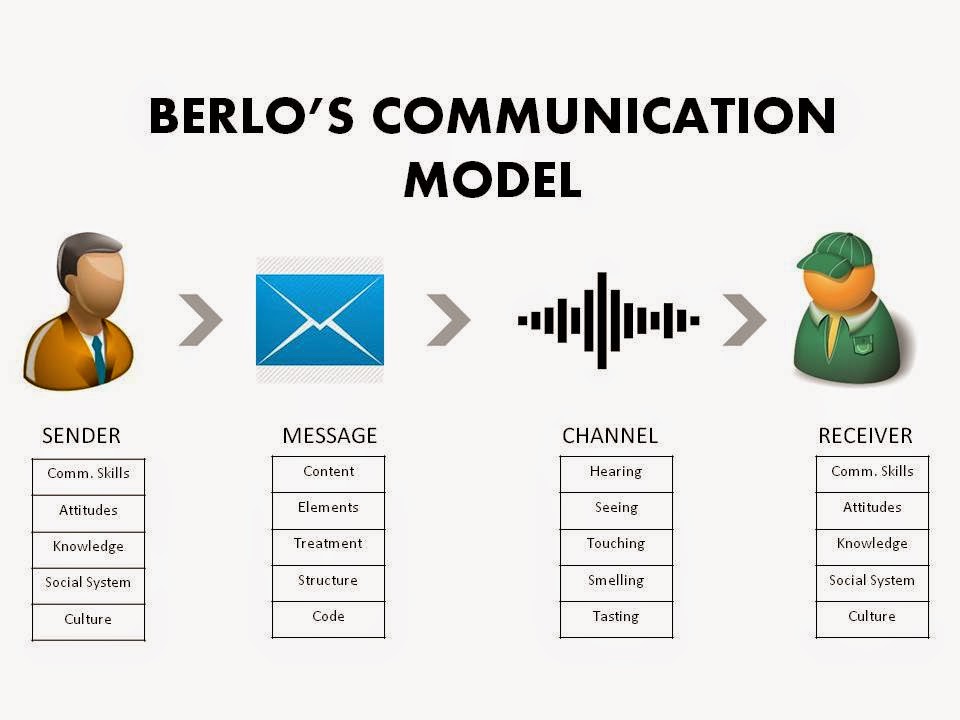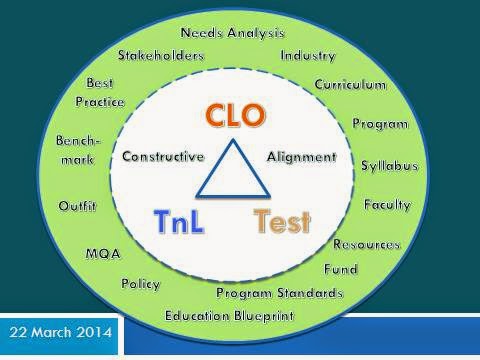Thursday 30 October 2014
Wednesday 15 October 2014
Wednesday 1 October 2014
Student Profile
Each faculty/programme should have a generic Student Profile as the term of reference to decide relevant and meaningful assessment methods.
Tuesday 23 September 2014
Addressing Plagiarism @ the U
Most students plagiarise because of several reasons.
- They want to sound and be like seasoned academic writers/authors.
- They have limited or no knowledge about writing academic articles according to the style and conventions of academic writing genre.
- They want to complete written academic assignments in the fastest manner possible (shortest time but with little effort).
- They are not accustomed to the concept of writing in drafts before achieving the final version.
 |
| Stealing ideas from others |
To avoid committing plagiarism, students should be made aware of strategies that they can acquire. They can learn to unlearn the misconceptions and incorrect practices about academic writing skills that they acquired in the past. In acquiring academic writing skills, several main strategies are listed below:
 |
| Distinguishing the forest and the trees |
 |
| Constructing the unifying blocks |
 |
| Analysing the moves |
Tuesday 16 September 2014
Student Engagement in Class
Providing a platform for students to be empowered, express their thoughts and learn meaningfully is essential for them to excercise their cognitive, affective and psychomotor abilities.
 |
| EPC460 class: Members of Team_1 Nazeem, Mimi, Felicia, Nani, Nik, Ahmad Sabirin Hussin (ASH) |
 |
| EPC460 class: Members of Team_2 Alleef Ashaari, Zalikha, Intan, Nadhrah, Raja Nazmi |
Coming soon: Video of their presentations
Communication Process
 |
| Team_1 |
 |
| Team_2 |
Communication Models
 |
| Team_1 |
 |
| Team_1 |
 |
| Team_2 |
 |
| Team_2 |
SELF DISCLOSURE
Saturday 13 September 2014
GES Experience
Friday 12 September 2014
The Clock Tower
The month of Zulhijjah is HERE! The last month of the Hijrah calendar witnesses the convergence of Muslims from around the world in the holy city of Makkah. They will be there to fulfill the fifth pillar of Islam i.e., to perform the Haj. The Clock Tower represents the ultra modern facade of Makkah.
 |
| The Clock Tower |
 |
| The view of Kaabah from the top of the Clock Tower. |
Wednesday 10 September 2014
The Curriculum and Assessment Development Framework
The framework that shapes curriculum and assessment.
There are dynamic and symbiotic interactions between the central core components (CCC) and the outer perimeter parameters (OPP).
There are dynamic and symbiotic interactions between the central core components (CCC) and the outer perimeter parameters (OPP).
The Contract Signed at Luh Mahfuz
Before the soul of every man is blown into his body (as a foetus in the womb of his mother), the soul has agreed to the terms and conditions (now referred as the framework or manhaj) stipulated by Allah. The framework/manhaj simply spells that every man must practice righteous deeds and avoid wrongdoings. And the details are elaborated in the Quran and Hadith. The Creator reminds us that Man and Jinn are created to worship Him. How so? It is all explained, described, elaborated and exemplified in the Quran [Surah 5 (Al Maidah): Verse 48; Surah 24 (AnNur): Verses 1, 34 and 35] and Hadith.
But a man may not know or simply forget his function and his very own existence on Earth. For a person born into a non Muslim family, his beliefs are shaped by his parents and the environment (society, economy, culture, religion and education). Hence, he may not know the reason(s) for his very own existence. For a person born into a Muslim family, he is exposed to the framework stipulated by Allah - his Creator. However, that does not mean that he practices what he has been taught about Islam. He may know about it but does not practice it. He is called a non-practicing Muslim. And he is fully accountable for the consequences that will befall him in the Hereafter.
A man is principally divided into 4 main components: 1) the soul (roh), 2) the intelligence (akal), 3) the body (jasad) and 4) the desire (nafsu).
But a man may not know or simply forget his function and his very own existence on Earth. For a person born into a non Muslim family, his beliefs are shaped by his parents and the environment (society, economy, culture, religion and education). Hence, he may not know the reason(s) for his very own existence. For a person born into a Muslim family, he is exposed to the framework stipulated by Allah - his Creator. However, that does not mean that he practices what he has been taught about Islam. He may know about it but does not practice it. He is called a non-practicing Muslim. And he is fully accountable for the consequences that will befall him in the Hereafter.
A man is principally divided into 4 main components: 1) the soul (roh), 2) the intelligence (akal), 3) the body (jasad) and 4) the desire (nafsu).
Wednesday 3 September 2014
Issue: Misconceptions about Academic Freedom in Assessment
Some educators lament that they
cannot exercise total academic freedom.
There
are lecturers who believe that they are the authority in their own field of
studies. Hence they assume they know what is best in their TnL and assessment.
They believe that they can exercise total academic freedom (in a very loose
sense, without referring to any form of educational assessment framework).
There
are evidences that showed non-alignment between course learning outcomes and
assessment items in the final exams. This may arise from ignorance about an
assessment framework or refusal to adhere to the assessment framework adopted
by the university/faculty. This action may be viewed as exercising total
academic freedom by certain quarters.
There
is a lack of understanding on what 'academic freedom' means. An analogy is
presented here. In real life, freedom to do what we want is always within the
boundary of the law written by a country or a religion. Hence, the boundary IS
the framework for the freedom that we can exercise in this country. Likewise,
the freedom to assess in the continuous assessment and the final examinations
should always be within the framework of the assessment adopted by the
university/faculty. At the Academy of Language Studies (APB), the assessment
frameworks are the Outcome-based Education (OBE) and the Common European
Framework of Reference (CEFR).
Tuesday 19 August 2014
The contract signed at Luh Mahfuz
Before the soul of every man is blown into his body (as a foetus in the womb of his mother), the soul has agreed to the terms and conditions (now referred as the framework or manhaj) stipulated by Allah. The framework/manhaj simply spells that every man must practice righteous deeds and avoid wrongdoings. And the details are elaborated in the Quran and Hadith. The Creator reminds us that Man and Jinn are created to worship Him. How so? It is all explained, described, elaborated and exemplified in the Quran [Surah 5 (Al Maidah): Verse 48; Surah 24 (AnNur): Verses 1, 34 and 35] and Hadith.
But man did not know or simply forget his function and his very own existence on Earth. For a person born into a non Muslim family, his beliefs are shaped by his parents and the environment (social, economy, culture, religion and education). Hence, he may not know the reason(s) his very own existence. For a person born into a Muslim family, he is exposed to the framework stipulated by Allah - his Creator. However, that does not mean that he practices what was taught in Islam. He may know about it but does not practice it. He is called a non-practicing Muslim. And he is fully accountable for the consequences that will befall him in the Hereafter.
A man is principally divided into 4 main components: 1) the soul (roh), 2) the intelligence (akal), 3) the body (jasad) and 4) the desire (nafsu)
But man did not know or simply forget his function and his very own existence on Earth. For a person born into a non Muslim family, his beliefs are shaped by his parents and the environment (social, economy, culture, religion and education). Hence, he may not know the reason(s) his very own existence. For a person born into a Muslim family, he is exposed to the framework stipulated by Allah - his Creator. However, that does not mean that he practices what was taught in Islam. He may know about it but does not practice it. He is called a non-practicing Muslim. And he is fully accountable for the consequences that will befall him in the Hereafter.
A man is principally divided into 4 main components: 1) the soul (roh), 2) the intelligence (akal), 3) the body (jasad) and 4) the desire (nafsu)
Subscribe to:
Posts (Atom)


.jpg)



















